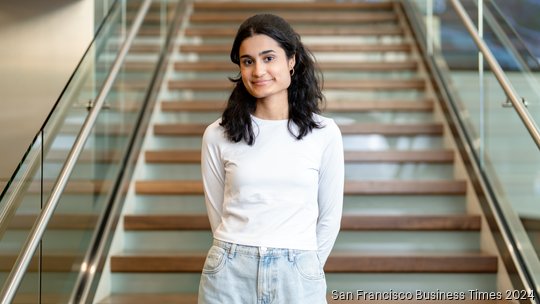
Editor's note: This year we honored some of the brightest young minds in the Bay Area innovation sector as part of our Inno Under 25 feature. Check out all the profiles from this year's honorees here.
A rising junior at UC Berkeley studying computer science and biology, Alishba Imran is already well on her way to achieving an exciting career based on her dual passions of scientific research and tech entrepreneurship. Originally from Toronto, her journey began in high school with projects addressing counterfeit medication in Pakistan and India, and continued with Voltex, a machine learning system for accelerating battery development. Now, Imran is focusing on computational machine learning and its applications in scientific discovery, particularly in biology and materials science. She’s working at the Chan Zuckerberg Initiative and the Berkeley AI research lab, exploring how cutting-edge ML methods can be used to discover new proteins for drug discovery and climate change solutions.
How did you get into tech entrepreneurship?
A few years ago, came to S.F. when I was working on a startup called Voltex, which was an ML platform that we were building to help accelerate battery development. So we got this grant funding from a fellowship called Delta fellowship. So they give you like $50,000 in non-diluted funding."
What are you currently working on?
Right now this summer, I'm working at the Chan Zuckerberg Initiative, so focused on understanding, single cells in biology and how different drugs and infections impact organelle dynamics and single cells. So that can be really impactful for drug discovery, or also just in general biology understanding, because we don't really understand how cells in our bodies work and interact. I'm also working with the Berkeley AI research lab, and that's more focused on protein models, so using more cutting edge ML methods like generative AI to help us discover new proteins which can be used for discovering new enzymes or problems relating to climate change.
Can you tell us about your project in high school addressing counterfeit medication?
The problem of counterfeit medications is a huge problem in rural parts of Pakistan and India. And the main issue is that there's no transparency in tracking. So if you go to a market and you're buying medication, you don't really know where it comes from. There's no level of guarantee. At the time I was learning about blockchain, and I realized this is a great application for supply chain tracking. So how do you have an on-chain track record of where the medication is as it moves along in the supply chain, and that almost acts as a guarantee to be able to catch counterfeit medication and verify them when they end up on shelves.
When did you know you wanted to be a startup founder?
I think it's interesting, because I wouldn't subscribe that title to myself in the sense. When I was in high school, I wasn't my dream is to be a startup founder. I think it was always very problem-oriented for me, and it just seems like becoming a founder, especially startups as an avenue, is a great way to scale impact.
About Imran
Age: 21
Residence: San Francisco
Education: Pursuing a bachelor's in biology and computer science at UC Berkeley
Role: Research scientist
Organizations: Chan Zuckerberg Biohub Network, Berkeley Artificial Intelligence Research



